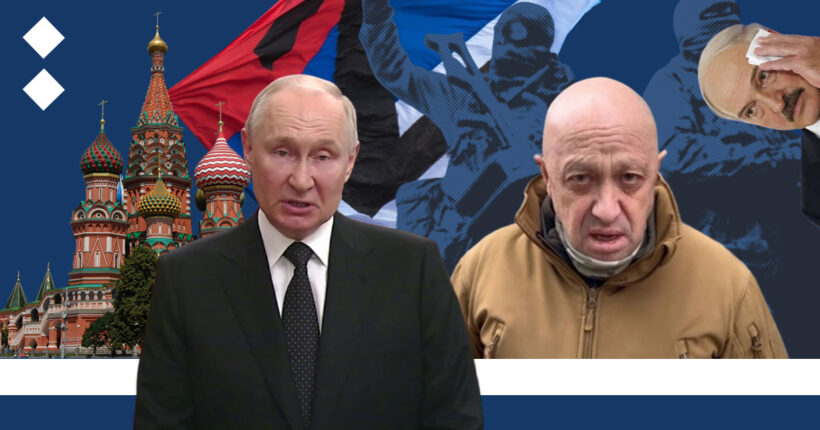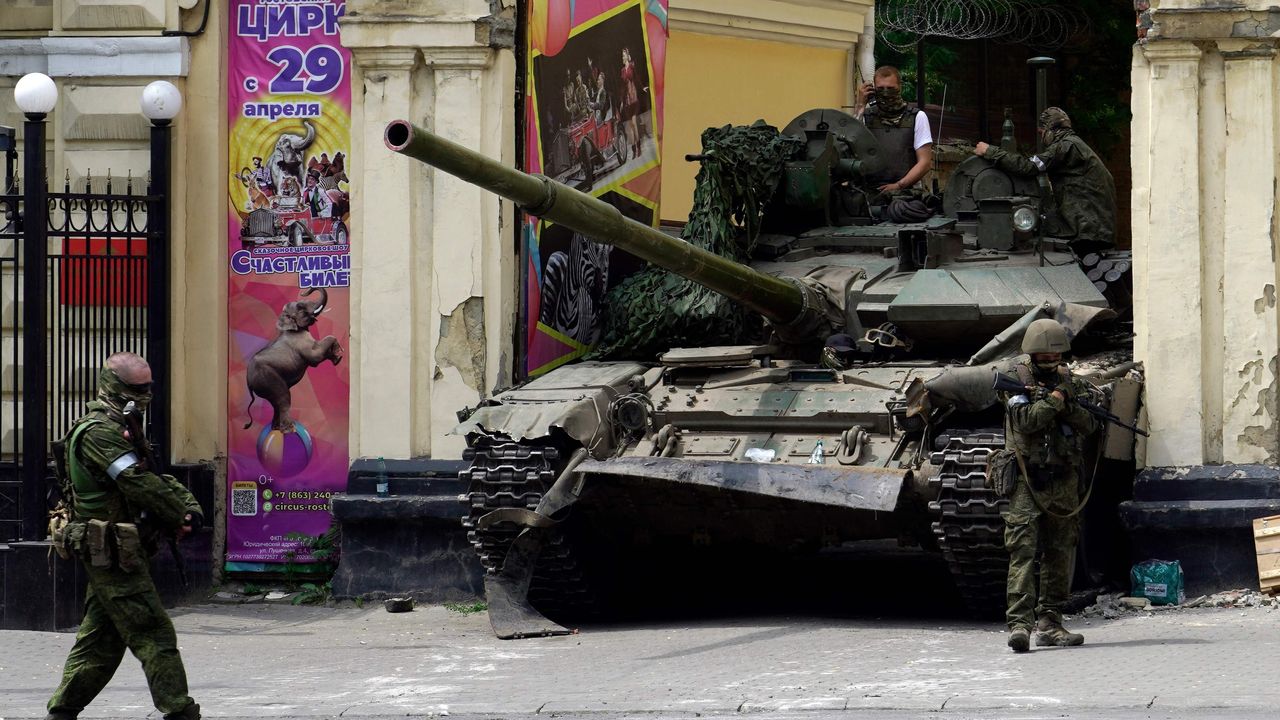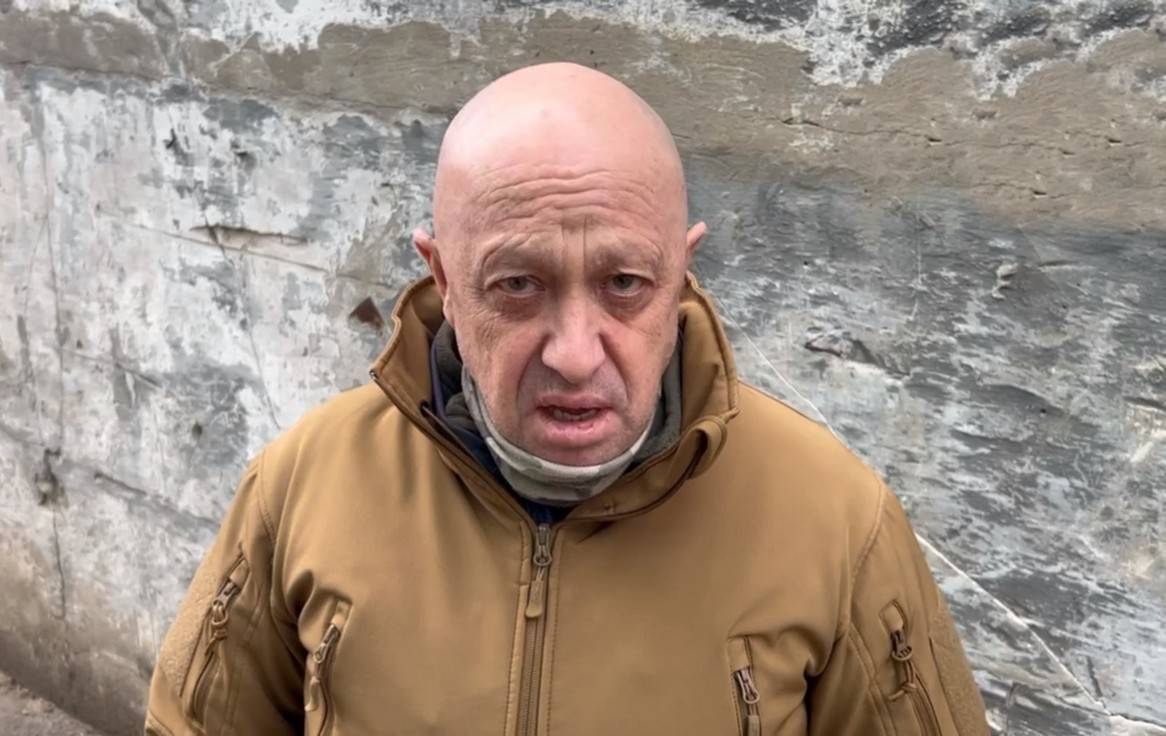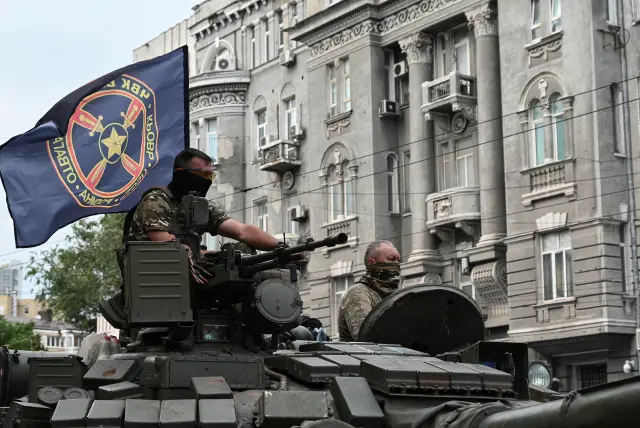
Wagner Group is a Russian paramilitary organization with a network of mercenaries, mostly consisting of criminals, and a de facto private army of Yevgeny Prigozhin. During hostilities in Ukraine, Prigozhin repeatedly criticized the leadership of the Russian army due to the inefficiency of its activities in Ukraine.
What happened on June 24? Chronology of events

Wagner soldiers riding a tank in Rostov-on-Don on June 24, 2023
The chronology of events was too full for one day:
- at first, Prigozhin declared that the Russian army fired missiles at the rear camps of his beloved Wagnerites and states the urgent need for revenge;
- then it was reported about the beginning of the grand campaign of Wagner "for justice" and for the heads of Russia's defense minister Shoigu and Chief of the General Staff Gerasimov;
- starting with the capture of Rostov-on-Don, the Wagner Group marched straight to Moscow, causing some disorder in Voronezh and almost in Lipetsk, 438 kilometers southeast of Moscow;
- along the way, the mercenaries eliminated several helicopters of the Russian Air Force and several units of automobile equipment;
- every Russian source of information screamed about the beginning of the civil war;
- a criminal case was opened against Prigozhin for organizing a mutiny, and his PMC turned from heroes of the war against Ukraine into terrorists and exiles;
- Putin himself made a speech in which he asked not to rock the boat, and Russian politicians began to express their support for him while simultaneously preparing their planes for takeoff and relocation to safer areas;
- on the doorstep of Moscow itself, the situation was saved by Belarussian president Lukashenko, who convinced Prigozhin to lay down arms in exchange for the opportunity to get immunity in Belarus.
This is exactly the picture painted by mass media and Telegram channels covering the events. Events developed swiftly, but as quickly as they started, they returned to the status quo of the year-and-a-half war.
Who was Prigozhin before, and what will he become after?

Yevgeny Prigozhin, head of the private military company Wagner repeatedly critisized Russia's military leadership
Prigozhin is considered almost one of the main pillars of Putin's regime. This analogy works when you imagine the regime itself as a pier and Prigozhin as a support: it catches waves, gets covered with shells and algae, rots and crumbles a little but holds its load. However, the support is one of many, and a little magic is needed so that its destruction will lead to the collapse of the entire structure. Putin's cook, as the Internet refers to Prigozhin, his wallet, and guard dog, who has more than 25 thousand mercenaries, but performs its functions on a leash, can be useful but cannot be indispensable. The autocratic empire of the former Soviet security police officer was not built on such a principle. There is no reliable confirmation that Prigozhin is that close to Putin. It is more accurate to call him a confidant of Putin's confidants: his access to Russia's president without intermediaries ended somewhere at the stage of photos of serving at the table.
Of course, the situation could change as Putin's appetite grew and Prigozhin's abilities grew. This has happened many times — alliances are broken, betrayals and treachery occur, Caesar says the legendary words to Brutus, and former servants depose their masters. Maybe Prigozhin decided to go his own way while he had an army and a favorable opportunity, or someone finally decided to use him to mold the candidacy of Putin's successor or an interesting competitor in the upcoming presidential elections. Motivation is not that important. After all, Prigozhin's political ambitions have been discussed at least since the autumn of 2022, but during all this time, he did not personally dare to criticize Putin.
During the search of the Wagner Center, 4 billion rubles in cash were found, the ownership of which Prigozhin willingly confirmed. He also explained that they are intended for salaries and other payments to the Wagnerites: cash has always been used for this, as stated in the contracts, which the owner of Wagner faithfully executes. No matter how it looks from the point of view of the law and financial literacy, the average citizen and potential Wagnerite will see in Prigozhin not just a warlord but a noble sovereign being whose vassal is an honor and a reliable, safe old age. What if such a leader becomes the president of the entire country? Prigozhin went on his campaign under the slogan of the most promising politician. However, in all seriousness, it looked like a circus with a Wagnerian tank stuck in its gates.
Was it an armed rebellion?

PMC Wagner on June 24 captured Rostov-on-Don
Columns of equipment, the capture of buildings, downed helicopters — yes, weapons were definitely demonstrated and used. Claims were made against top generals and state officials, and specific military state policies were criticized; calls for disobedience of the army and change of order were sounded — everything looked like a mutiny. Another question is whether there was a direct threat to the authorities and the state. There will be no clear answer because, in today's Russia, the regime's needs do not coincide with those of the state. A simple example: a city of a million people was under the control of a large group of armed individuals for a whole day, who committed a bunch of offenses starting with traffic rules and ending with frankly criminal violations with potentially substantial prison terms, but suffered neither immediate nor delayed punishment. The Wagner column traveled more than 200 km along federal roads and did not meet effective resistance. All those responsible for the law and order of the service showed themselves from the worst side, choosing the role of passive observers, which is equivalent to admitting their own professional unfitness. Against the background of this collapse of state administration, two essential and incomprehensible things are happening:
- Prigozhin, who seemed to have drawn the lucky ticket of the effect of surprise and had every chance to realize his vision of justice, declared the inadmissibility of repentance and the desire to go to the end, suddenly stops halfway and turns around;
- Putin, who has sufficient means of remote destruction, feigns impotence, as if luring Prigozhin into a trap, and finally lets him go.
Such actions are uncharacteristic of the rebels, their opponents in power, or the actual war conditions in which they came together in confrontation. Russian fixation on certain historical periods and events does not allow for ignoring parallels and analogies. Putin himself mentioned World War I, during which the Russian Empire disappeared. Having such a demonstrative example, Putin's regime tries not to allow even a remote likeness of it. Meanwhile, an army commander passes almost his entire route unopposed and is released afterward unpunished. A true opponent, after such a display of weakness, will definitely finish what he started — a real usurper understands this perfectly. If they parted so peacefully and calmly, it is worth looking for inauthenticity in something.
What might be Putin's benefit?
Putin proved he is a skillful tsar under useless boyars: the Wagnerites traveled hundreds of kilometers through the territory of several regions, but the governors only managed to produce meaningless statements about control over the situation. The leaders of the subjects of the federal state turned out to be helpless in the face of a real threat. Instead, Putin resolved the entire conflict by simply delegating the relevant task to the president of a neighboring state, not to mention that he showed himself as a mature ruler who could drown the rebellion in blood but limited himself to almost parental instructions.
What else did the campaign of the Wagner group demonstrate?
- It has been verified practically that Moscow can be reached by a properly equipped column of combat vehicles in half a day.
- In a truly constitutional state, even the most severe criminal case can be closed before the investigation begins, and the rebels will receive legal immunity.
- In the name of the high and noble goal of preserving its own power, Putin's regime is happy to sacrifice all Russians, but so far, it has stopped at 12 pilots, eliminated by Prigozhin's mercenaries.
- Whatever happens in Russia, the world should not rely on rose-colored glasses.
- All this is possible only in a fragile state or one that only wants to appear weak.
How should Ukraine react?
There is such a Hollywood action movie, Alien vs. Predator, in which people unwillingly find themselves in the epicenter of a deadly confrontation between two races of monsters who are endlessly at war. The movie's slogan is symbolic enough to be mentioned: "Whoever wins, we lose." No matter how Prigozhin's mutiny ended, it would have brought Ukraine only a small amount of material benefit in the form of destroying Russian equipment and losing human resources. The option of mutual destruction is even ridiculous to consider because it does not happen in imitations, even if losses are allowed. The winner would intensify and would not give up the war in any case.
For Ukraine, it would be better if the Russians shot each other as effectively and on a large scale as possible, but in no case can Ukrainians relax, allowing wishful thinking.







